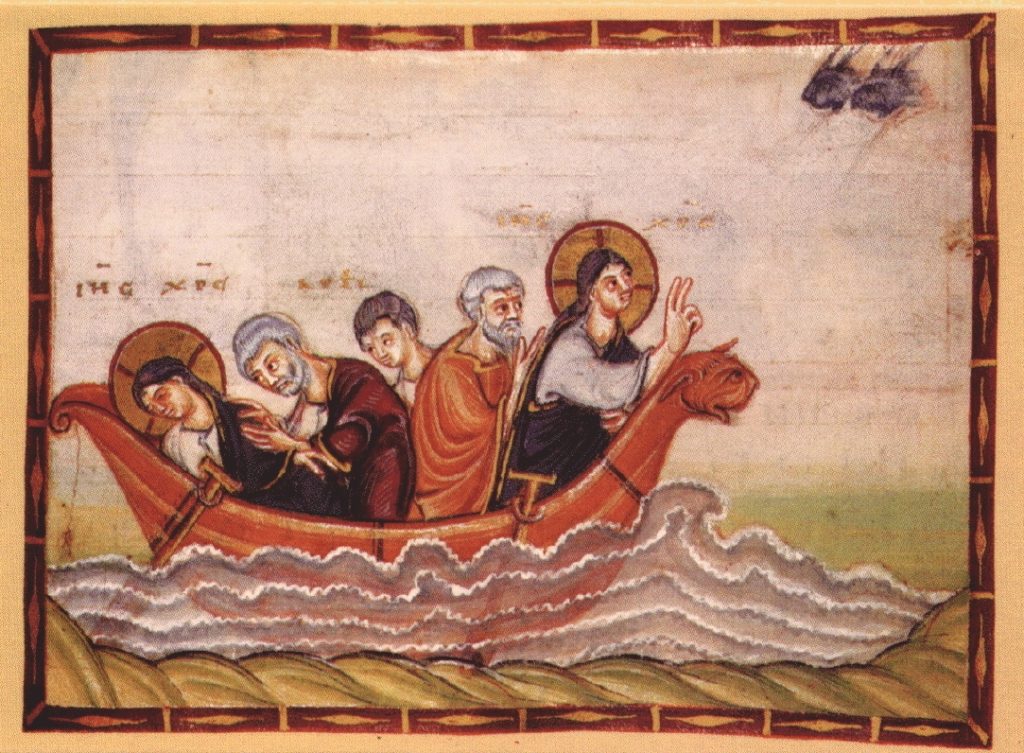What is an Apostle? (And How it Relates to all the Boat Scenes in the Bible)
Our Lord Jesus Christ founded a New Israel with Himself as Davidic King and with Twelve Apostles initiating the new Twelve Tribes of Israel. This is the Messianic Kingdom of the Church.
As one who connects the Old Testament features to Catholic dogma (see this book: The Crucified Rabbi), I’ve always been painfully aware that the term “apostle” doesn’t have a slick connection to Old Testament kingdom language.
Pagan “Boat” Sources for the Term Apostle:

In pagan Greek sources (such as in the writings of the Greek historian Herodotus), ἀπόστολος (apostolos) refers to a political or military delegate or messenger. ἀπόστολος also refers to the commander of a naval force.
In fact, στόλος refers to a naval division or to a colony. So an ἀπόστολος is one who travels out to these naval colonies. Sometimes ἀπόστολος is used to refer to a formal naval dispatch or to an export license to/from these colonies.
So when the New Testament authors adopt this Greek term, they are not merely referring to a local rabbi or preacher. They are using a term that referred to diplomats who traveled to the farrest ends of the earth. It’s a global or catholic term.
Pauline Sources for the Term:
The term ἀπόστολος appears only once in the Greet Septuagint (Greek version of Old Testament) at 1 Kings 14:6 where ἀπόστολος is a translation of the Hebrew שָׁלוּחַ (sha-lach). The term appears 79 times in the New Testament – 68 of which are found in the writings of Paul and his disciple Luke.
It seems that originally ἀπόστολος referred to each of the original Twelve Apostles. However, Saint Paul opened the term to include himself, Barnabas (Acts 14:14) and Timothy and Silvanus (1 Thessalonians 2:7). Paul also speaks of false apostles in 2 Corinthians.
In Hebrews, Luke/Paul identify Jesus as “the apostle and high priest of our confession” (Heb 3:1). In this context, apostleship is associated with the high priesthood. This is our biggest hint into how early Christians understood the term ἀπόστολος. It was missionary and priestly. Just as an ἀπόστολος origianlly referred to naval delegates to colonies, so a high priest bridges over water as a pontifex, a bridge builder between God and man.
According to Paul, apostles surpass the various other offices within the Church of “teachers, evangelists, and prophets” (διδάσκαλος, εὐαγγελιστής, προφήτης). In the mind of Paul, an apostle is more than these three. I would argue, that for Paul an apostle is all three of these at once while also being priestly diplomats for Christ.
Are Apostles Political or Priestly?
At first glance into a Greek dictionary, the term ἀπόστολος seems political or mercantile. It’s a civil title. However, the Christians looked to King Melchizedek and King David as “priest kings” or “liturgical kings” as the prototypes for King Jesus. So the political realm collapses into the priestly liturgical realm. This is why Christ is both establishing a “kingdom” (political) and also building at “temple” (priestly). He is king and pontiff. And so also, his political ministers are both political and cultic. The ἀπόστολος is a naval delegate for foreign colonies throughout the world but he is also a sacrificial priest who offers the Gentiles to God as sacrifice and who offers the Eucharist as sacrifice.
Apostles on a Boat:
One final related topic. I couldn’t help but noticed that in Acts, the vivid scenes of Paul traveling by ship may in fact be intentionally recounted with detail to bolster Paul’s identity as ἀπόστολος. In the Greek mind, the ἀπόστολος is primarily naval and thus Paul is literally fulfilling his role as ἀπόστολος (maybe better so than the Twelve!). Also, the stories of Saint James Zebedee going to and from (posthumously) to Spain by boat ratifies James as a true apostle for Jesus. And let’s not forget all the “Jesus in a boat” scenes from the Gospels!
[reminder]
What to Watch Next
SHOP THE TAYLOR MARSHALL STORE
Dive Deeper

GET CONFIDENT IN YOUR FAITH
Explore the fascinating world of Catholic teachings with Dr. Marshall. Together you’ll unpack the brilliant answers the Church gives to tough questions about the Faith. The best part: you go at your own pace. Start this exciting journey today.


 >
>


